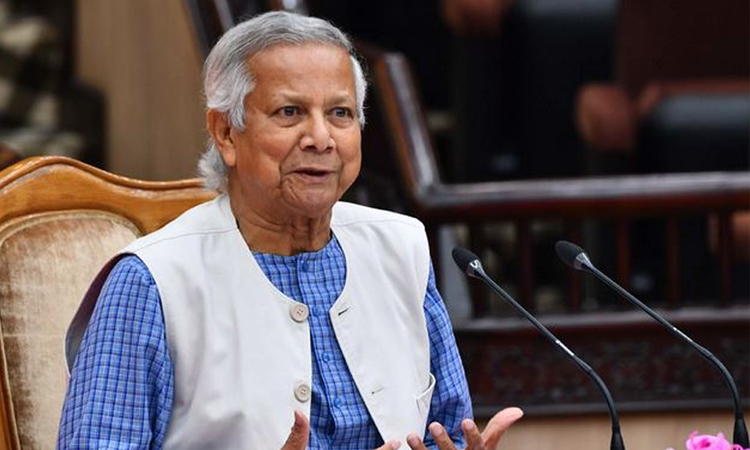News Flash

NEW YORK, Sept 22, 2025 (BSS) - Chief Adviser Professor Muhammad Yunus today said the persistent shadow of global conflict threatens peace, stability and development.
He made the remark while delivering his Keynote Speech at the UN High Level Side Event on Social Business, Youth and Technology at UN Headquarters in New York.
"Today, more than ever, the future stands at a crossroads. Wildfires of climate change scorch the earth. Inequality deepens. Conflicts rage," the chief adviser said.
He said the struggle for justice and peace tests "our very humanity", while these crises are interconnected threads, each pulling at the other, shaping the whole of their existence.
"The power to mend this tapestry does not lie in the past—it lies in the future we dare to imagine, and in the choices we make here and now," Prof Yunus said.
He also said the path to a better world is built with today’s courage, action, and unwavering commitment.
Wars and displacements ripple across borders, disrupt economies, endanger food security, and shatter human lives, the chief adviser said.
He said: "In the face of these interconnected crises, old solutions are inadequate. What we need urgently is renewed multilateral diplomacy, deeper international cooperation, and collective commitment to sustainable development."
He said many countries, including Bangladesh, are preparing to graduate from LDC status amid severe challenges.
For Bangladesh, Prof Yunus said this includes hosting 1.3 million forcibly displaced Rohingyas, managing repeated climate shocks, and navigating global economic turbulence.
In such a context, reducing UN budgets or shrinking official development assistance would be counterproductive, he said.
Instead, he said, the world must redouble efforts to expand international support, provide technical assistance, and ensure a just transition for nations facing heightened vulnerability.
The chief adviser said the global conflicts do more than immediate harm; they also undermine our shared vision for a sustainable future.
As an advocate for the Sustainable Development Goals, he said he has long believed that these goals cannot be fully realised within the current global system—a system still dominated by the relentless pursuit of profit over people.
Under these conditions, the path to the SDGs can indeed appear bleak, he said.
"But I am not here to dwell on the gloom. I am here to propose a shift—a transformation of the system itself,” he added.
"We must move toward an economy that places human well-being, social justice and environmental stewardship above the narrow accumulation of wealth. This is not a utopian ideal. It is a necessary evolution," Prof Yunus said.
He said at the heart of this new economy lies social business since social business is not a niche concept—it is a fundamental principle: that business can and must exist to make a difference, not just a profit.
It began humbly, with a one-dollar loan but today it has grown into a global movement, he said.
He also said from healthcare and renewable energy to education and even sports, social businesses are showing that it is possible to tackle the world’s most pressing challenges while remaining economically sustainable.
"They are living proof that another world is within reach—a world where commerce serves humanity, where growth includes everyone and where profit is measured not only in financial returns but in lives improved, communities strengthened and our planet healed," the chief adviser said.
Noting that the current civilization is on a self-destructive path—one defined by endless extraction, consumption and accumulation, he said the people are endangering the very planet that sustains them.
"To change course, we must build a new civilization—one motivated not by greed but by a shared commitment to solving human and planetary challenges," Prof Yunus said.
He said in this new world, wealth must be shared, not concentrated.
"Power held in too few hands weakens the whole of society. And business must be redefined—not as a vehicle for personal profit, but as an engine for social good," he added.
Prof Yunus said this is the promise of social business and this is how we will truly achieve the Sustainable Development Goals.
But, he said, this new civilisation will not be built by the same minds that created the old one.
"It will be designed and driven by young people—the architects of the future. Unlike previous generations, shaped by outdated systems, today’s youth see what could be, not just what is. Their imagination is limitless," the chief adviser said.
He mentioned that he often says: “Where imagination leads, innovation follows.”
"If we can imagine it, it can happen. If we don’t, it never will," he said, encouraging young people to channel their creativity into social business—where real, sustainable solutions to climate change, unemployment, poverty and inequality are born.
At this pivotal moment, he called upon the youth of the world to lead—not tomorrow, but today. "Dream boldly, but act deliberately. Change doesn’t have to start big."
About the rise in technology, Prof Yunus said the world stands at the brink of a new technological era—one defined by artificial intelligence, big data, renewable energy and other transformative innovations.
He said these tools have the power to reshape industries, societies, and the very fabric of human progress.
"But their promise is paired with profound responsibility. Will these technologies become a blessing for humanity—or a source of harm? The answer is not yet written. It will be determined by the choices we make today and by the values we instill in tomorrow’s leaders—especially our youth," Prof Yunus said.
He said the future of technology must be shaped not by ambition alone, but by conscience. Not by competition, but by collaboration. Not for the few, but for all.
"Let us ensure that this new technological era becomes an era of empathy, equity, and shared progress," the chief adviser said.